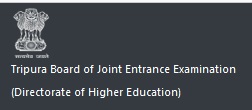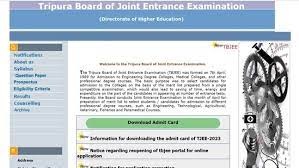tbjee.nic.in TJEE Syllabus Tripura Joint Entrance Examination
Organisation : Tripura Board of Joint Entrance Examination TBJEE
Exam Name : Tripura Joint Entrance Examination TJEE
Announcement : Syllabus
Website : https://tbjee.nic.in/
TBJEE TJEE Syllabus
PHYSICS :
MODULE – 1 :
** Scope and excitement; nature of physical laws; Physics, technology and society. Need for measurement: Units of measurement; systems of units; SI units, fundamental and derived units. Length, mass and time measurements;
** Accuracy and precision of measuring instruments; errors in measurement; significant figures Dimensions of physical quantities, dimensional analysis and its applications
** Frame of reference (inertial and non-inertial frames), Motion in a straight line; Position-time graph, speed and velocity
Related / Similar Entrance : ANUEET Syllabus ANU Engineering Entrance Test

** Uniform and non-uniform motion, average speed and instantaneous velocity, uniformly accelerated motion, velocity-time and position-time graphs, for uniformly accelerated motion (graphical treatment), Elementary concepts of differentiation and integration for describing motion
** Scalar and vector quantities: Position and displacement vectors, equality of vectors, multiplication of vectors by a real number; addition and subtraction of vectors, Unit vector, Zero Vector, Resolution of a vector in a plane, Scalar and Vector products of Vectors, Relative velocity
** Motion in a plane, Cases of uniform velocity and uniform acceleration, projectile motion, Uniform circular motion
MODULE – 2 :
** Force and inertia, Newton’s first law of motion; momentum and Newton’s second law of motion; impulse; Newton’s third law of motion, Law of conservation of linear momentum and its applications, Problems using free body diagrams
** Equilibrium of concurrent forces, Static and Kinetic friction, laws of friction, rolling friction Dynamics of uniform circular motion, Centripetal force, examples of circular motion (vehicle on level circular road, vehicle on banked road)
** Work done by a constant force and a variable force; kinetic and potential energies, work energy theorem, power
** Potential energy of a spring, conservation of mechanical energy, conservative and non- conservative forces; Elastic and inelastic collisions in one and two dimensions, motion in a vertical circle
** Centre of mass of a two-particle system, Centre of mass of a rigid body, momentum conservation and motion of centre of mass, centre of mass in some symmetric bodies.
** Basic concepts of rotational motion; moment of a force, torque, angular momentum, conservation of angular momentum and its applications; moment of inertia, radius of gyration,
** Values of moments of inertia for simple geometrical objects, parallel and perpendicular axes theorems and their applications to some problems,Equilibrium of rigid bodies, rigid body rotation, equations of rotational motion
MODULE – 3 :
** Kepler’s laws of planetary motion, the universal law of gravitation Acceleration due to gravity and its variation with altitude, depth and rotation of earth Gravitational potential energy; gravitational potential, escape speed
** Orbital velocity, time period and mechanical energy of an artificial satellite, Geo-stationary satellites
** Elastic behavior, Stress-strain relationship, Hooke’s law, Young modulus, bulkModulus, modulus of rigidity, poison’s ratio; elastic strain energy
** Pressure due to a fluid column; Pascal’s law and its applications (hydraulic liftand hydraulic brakes), Effect of gravity on fluid pressure
** Viscosity, Newton’s law of viscous force, co-efficient of viscosity, Stoke’s law, terminal velocity, Reynold’s number, streamline and Turbulent flow, Critical velocity,Bernoulli’s theorem and its applications.
** Idea of cohesive and adhesive forces, Surface energy and surface tension, angle of contact, excess Pressure for liquid drop, liquid bubble and air bubble, capillary rise
MODULE – 4 :
** Heat, temperature, thermal expansion; thermal expansion of solids, liquids, and gases, anomalous expansion of water and its effect, specific heat capacity at constant pressure and constant volume and their inter-relation, Calorimetry, change of state – idea of latent heat
** Heat transfer- conduction and thermal conductivity, convection and radiation, Qualitative ideas of Black Body Radiation, absorptive and emissive powers, Kirchhoff’s law, Wien’s displacement law, Newton’s law of cooling and Stefan’s law, Green House effect
** Thermal equilibrium and definition of temperature (Zeroth law of Thermodynamics), Heat, work and internal energy
** First law of thermodynamics, various thermodynamic processes viz. isothermal, adiabatic, isobaric, isochoric processes, work done in thermodynamic process (both isothermal and adiabatic)
** Second law of the thermodynamics, Reversible and irreversible processes, Idea of heat engine, Carnot’s engine and its efficiency
** Ideal gas laws, equation of state of a perfect gas, Assumptions of kinetic theory of gases, concept of pressure, r. m. s. speed of gas molecules, Kinetic energy and temperature; degrees of freedom, law of equipartition of energy (statement only) and application to specific heat capacities of gases; concept of mean free path, Avogadro’s number
MODULE – 5 :
** Periodic motion – period, frequency, displacement as a function of time, Periodic functions, Simple harmonic motion (S.H.M.) and its equation; phase; mechanical energy in S.H.M.,Simple pendulum – expression for its time period; oscillations of a spring -restoring force and force constant; some other examples of SHM Free, forced and damped oscillations (quantitative ideas only), simple examples, resonance
** Wave motion, Longitudinal and transverse waves, speed of a wave,Expression for displacement of a plane progressive wave, relation between particle and wave velocity, Principle of superposition of waves, reflection of waves, Standing waves in strings and organ pipes, fundamental mode and harmonics, Beats, Doppler effect in sound
Download TJEE Syllabus here : https://www.syllabus.gen.in/uploads/pdf2024/3308-tjee.pdf
Instructions Regarding Examination for TJEE
1. The Tripura Joint Entrance Examination will be conducted in a single day as notified.
2. There will be three shifts:- first shift will consist of Physics and Chemistry question papers, and subsequent two shifts will be consisting of Biology and Mathematics question paper.
3. The Board is conducting the examination through Optical Marks Recognition (OMR) system. The pattern of questions is Multiple Choice Question (MCQ) type.
4. The medium of Question Paper shall be in English and Bengali.
5. Four different subjects (Physics & Chemistry; Mathematics and Biology) will have Question paper series (P, Q and R).
6. The questions of the examination will be framed on the basis of the Syllabus available in the website.
7. The syllabus for each subject is divided into 10 Modules.
8. There will be 30 (thirty) compulsory questions for each subject, taking 3 (three) questions from each Module.
9. Each question will carry 4 (four) marks, i.e. total marks will be of 120 (30×4) for each subject.
10. Duration of Examination of first shift (Physics and Chemistry) will be 90 minutes for 60 (sixty) questions and subsequent two shifts will be of 45 minutes each i.e total timing 3 hrs.
11. Each question will have four options (i.e. A, B, C, D) out of which the correct/ closest option (A/B/C/D) is only to be identified in the OMR sheet.
12. One mark will be deducted for each wrong answer.
13. The percentile score of the students will be published along with the ranking during the publication of result.

What is Tripura Joint Entrance Examination?
The Tripura Board of Joint Entrance Examination (TBJEE) will conduct Tripura Joint Entrance Examination (TJEE)-2024 based on its existing syllabi, to prepare a merit list for admission to Engineering, Technological, Veterinary, Agriculture, Fisheries, Paramedical and other Professional Degree Courses against available seats reserved for the State of Tripura.
It is to be noted that the admission of a candidate to a certain College / University will be subjected to the fulfillment of eligibility criteria regarding cut-off marks and other norms as specified by the respective departments of State & Central Government/ Institution/ Council/ Body etc.